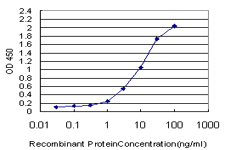CCL15 Antibody (monoclonal) (M05)
Mouse monoclonal antibody raised against a partial recombinant CCL15.
- 产品详情
- 实验流程
- 背景知识
Application
| E |
|---|---|
| Primary Accession | Q16663 |
| Other Accession | NM_032965 |
| Reactivity | Human |
| Host | mouse |
| Clonality | monoclonal |
| Isotype | IgG2a Kappa |
| Clone Names | 3B1 |
| Calculated MW | 12236 Da |
| Gene ID | 6359 |
|---|---|
| Other Names | C-C motif chemokine 15, Chemokine CC-2, HCC-2, Leukotactin-1, LKN-1, MIP-1 delta, Macrophage inflammatory protein 5, MIP-5, Mrp-2b, NCC-3, Small-inducible cytokine A15, CCL15(22-92), CCL15(25-92), CCL15(29-92), CCL15, MIP5, NCC3, SCYA15 |
| Target/Specificity | CCL15 (NP_116741, 25 a.a. ~ 113 a.a) partial recombinant protein with GST tag. MW of the GST tag alone is 26 KDa. |
| Dilution | E~~N/A |
| Format | Clear, colorless solution in phosphate buffered saline, pH 7.2 . |
| Storage | Store at -20°C or lower. Aliquot to avoid repeated freezing and thawing. |
| Precautions | CCL15 Antibody (monoclonal) (M05) is for research use only and not for use in diagnostic or therapeutic procedures. |
For Research Use Only. Not For Use In Diagnostic Procedures.
Provided below are standard protocols that you may find useful for product applications.
BACKGROUND
This gene, chemokine (C-C motif) ligand 15, is one of several CC cytokine genes clustered on 17q11.2. The CC cytokines are secreted proteins characterized by two adjacent cysteines. The cytokine encoded by this gene is chemotactic for T cells and monocytes and induces N-acetyl-beta-D-glucosaminidase release in monocytes. It induces changes in intracellular calcium concentration in monocytes and is thought to act through the CCR1 receptor. Read-through transcripts are expressed that include exons from the downstream cytokine gene, chemokine (C-C motif) ligand 14, and are represented as GeneID: 348249.
REFERENCES
Interleukin-9 polymorphism in infants with respiratory syncytial virus infection: an opposite effect in boys and girls. Schuurhof A, et al. Pediatr Pulmonol, 2010 Jun. PMID 20503287.Personalized smoking cessation: interactions between nicotine dose, dependence and quit-success genotype score. Rose JE, et al. Mol Med, 2010 Jul-Aug. PMID 20379614.New genetic associations detected in a host response study to hepatitis B vaccine. Davila S, et al. Genes Immun, 2010 Apr. PMID 20237496.Mycobacterium tuberculosis-induced expression of Leukotactin-1 is mediated by the PI3-K/PDK1/Akt signaling pathway. Cho JE, et al. Mol Cells, 2010 Jan. PMID 20016943.A novel role for constitutively expressed epithelial-derived chemokines as antibacterial peptides in the intestinal mucosa. Kotarsky K, et al. Mucosal Immunol, 2010 Jan. PMID 19812544.
终于等到您。ABCEPTA(百远生物)抗体产品。
点击下方“我要评价 ”按钮提交您的反馈信息,您的反馈和评价是我们最宝贵的财富之一,
我们将在1-3个工作日内处理您的反馈信息。
如有疑问,联系:0512-88856768 tech-china@abcepta.com.























 癌症的基本特征包括细胞增殖、血管生成、迁移、凋亡逃避机制和细胞永生等。找到癌症发生过程中这些通路的关键标记物和对应的抗体用于检测至关重要。
癌症的基本特征包括细胞增殖、血管生成、迁移、凋亡逃避机制和细胞永生等。找到癌症发生过程中这些通路的关键标记物和对应的抗体用于检测至关重要。 为您推荐一个泛素化位点预测神器——泛素化分析工具,可以为您的蛋白的泛素化位点作出预测和评分。
为您推荐一个泛素化位点预测神器——泛素化分析工具,可以为您的蛋白的泛素化位点作出预测和评分。 细胞自噬受体图形绘图工具为你的蛋白的细胞受体结合位点作出预测和评分,识别结合到自噬通路中的蛋白是非常重要的,便于让我们理解自噬在正常生理、病理过程中的作用,如发育、细胞分化、神经退化性疾病、压力条件下、感染和癌症。
细胞自噬受体图形绘图工具为你的蛋白的细胞受体结合位点作出预测和评分,识别结合到自噬通路中的蛋白是非常重要的,便于让我们理解自噬在正常生理、病理过程中的作用,如发育、细胞分化、神经退化性疾病、压力条件下、感染和癌症。






